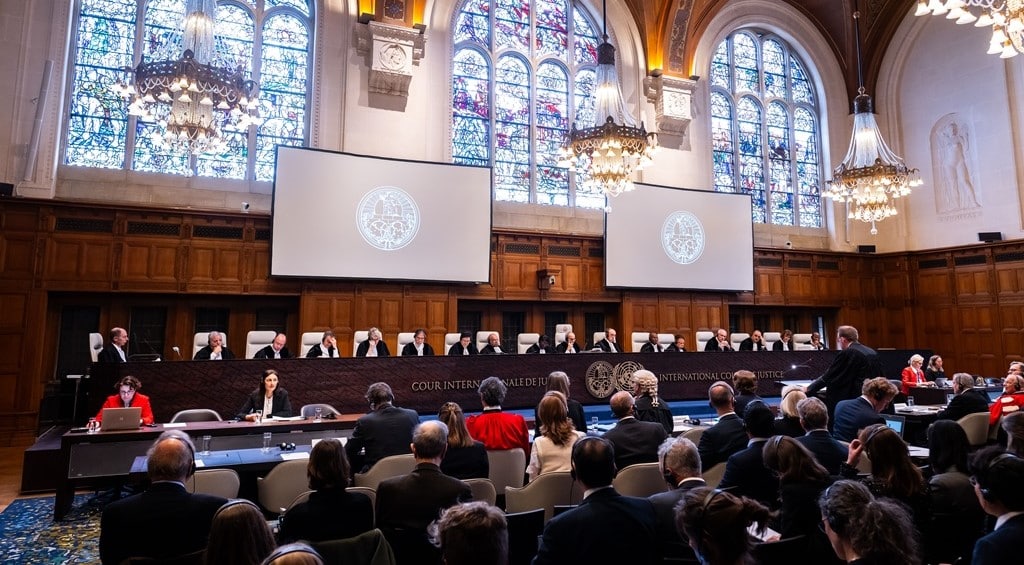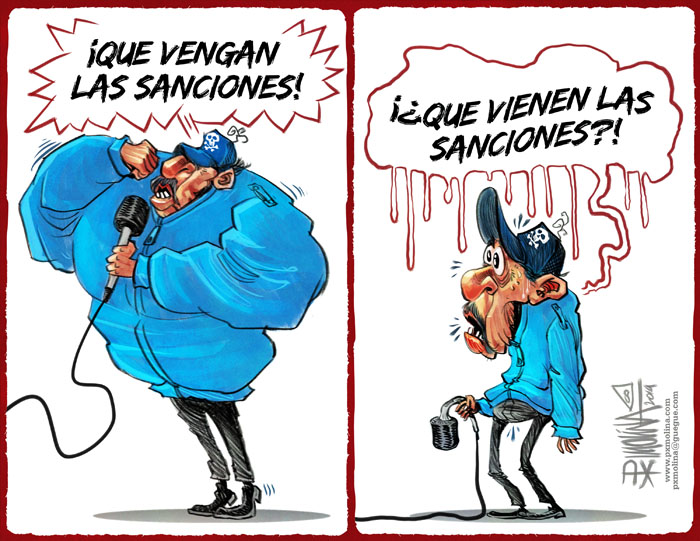15 de mayo 2019

ICJ Rules Against Nicaragua's Request For Germany to Halt Arms Sales to Israel

PUBLICIDAD 1M
PUBLICIDAD 4D
PUBLICIDAD 5D
A political solution is not in the inertia of the economic crisis, nor in the sanctions, but in the expansion of the national alliance.

I’m not afraid of sanctions! Are the sanctions really coming?!
The stalemate in negotiations between the Civic Alliance and the Ortega-Murillo dictatorship, as a result of the intransigence of commander Daniel Ortega, threatens to liquidate the second attempt at the national dialogue. Two weeks ago, Ortega disavowed his delegation, led by Foreign Minister Denis Moncada, after he agreed with the Civic Alliance the proposal of international witnesses to implement the release of all political prisoners and the restoration of public freedoms.
If the negotiation is agonizing, therefore, it is not because of the inflexibility of the negotiators to reach an agreement, but because Ortega annulled what his delegates had agreed to: to release in the month of May—before the official deadline of 90 days expires—all the political prisoners, who are also the leaders of the civic protest.
The new pretext of the dictatorship to justify the breach of the agreement is to demand that the Alliance make an appeal for the suspension of international sanctions. However, even the supporters of the regime admit that the key for the suspension of the sanctions, and to avoid the application of new and more severe sanctions, only Ortega and Murillo have it. International sanctions will be suspended the moment Ortega releases all political prisoners, restores public freedoms and facilitates political reform to call early elections.
The apparent irrationality of Ortega is explained, in part, by his commitments in the political alliance with Cuba and Venezuela. While Maduro resists the pressure of more than fifty countries that repudiate his government and tries to crush the challenge of Guaido, Ortega will continue entrenched in Nicaragua torpedoing the political negotiation. His priority is to preserve at all costs his personal-family leadership without offering the country a way out, and he condemns us all, including his government, the Nicaraguan Army, the FSLN party, and the businessmen -the Sandinistas as well as those grouped in the private sector chambers-, to the collapse of the national economy, which means more unemployment and impoverishment for hundreds of thousands of families.
Between June 18 and 26, the deadline of 90 for the release of political prisoners expires, the Law Nica Act will be applied and the OAS General Assembly will be installed, in which the foreign ministers of the continent will decide on violations to the Inter-American Democratic Charter. So if Ortega continues to play Nicolas Maduro’s cards, nothing can prevent new international sanctions from the OAS, the European Union and the Unites States Government.
Faced with this announced crisis, the blue and white movement faces the dilemma of waiting and seeing what impact the new sanctions will have on the Ortega regime, or exerting more civic pressure, not in Washington or Brussels, but in Managua, adding forces that still continue to support Ortega such as the FSLN and the Army, or those that are not yet fully committed to political change, like the big businessmen.
The resistance against the dictatorship is strongly implanted in the prisons, in protests that defy repression and in exile. To achieve a true national solution, we still need to weaken Ortega’s support base and add new democratic actors. What incentives would the businessmen, the army and the FSLN have to opt for political change?
Big Business
For a decade, the corporatist alliance of the big businessmen with Ortega gave the dictatorship political legitimacy and economic stability, at the expense of democracy and transparency. This model collapsed with the April massacre, and businessmen have been consistent in demanding from Ortega a new political agreement, reforms and early elections.
The distancing from the regime has been a necessary step to weaken Ortega, but it is not enough to help promote political change that leads to a sustainable development model with democracy. Business leaders have the economic muscle and social legitimacy to exert more pressure effectively, in the immediate environment of Ortega and Murillo, in the government bureaucracy, and among Sandinista businessmen, who also seek for a way out.
With some meritorious exceptions, business leaders do not dare to commit themselves for democracy and hope that inertia will lead to the “soft landing,” forgetting that political inaction can also lead to the total derailment of the country. The dilemma of the entrepreneurs is whether to remain anchored in a short-term vision, which could prolong the agony of the regime and cause the destruction of the economy, or venture out into the uncertainty of promoting a change that leads to a democratic transition.
The Nicaraguan Army
The Nicaraguan Army has been dragged into the Ortega crisis because of the inability of its military command to defend the institutional legacy of the democratic transition. Under the command of General Julio Cesar Aviles, the military institution succumbed to the cooptation of the strong-man, weaving a web of interests, private businesses and corruption.
The top officers that make up the Military Council, as well as former military that believed in democracy, have sufficient information and political experience to warn that the Ortega government is experiencing a terminal crisis, which threatens the legitimacy and credibility of the Army, questioned for its complicity with the regime. Consequently, they should not wait until the country is on the edge of the abyss and of a new massacre, to pronounce itself and act categorically in favor of a political, peaceful and constitutional solution.
Consistent with its own institutional tradition established in the 1990s, especially during the Aleman government (1997-2002), the Army is forced to place limits on Ortega’s authoritarian power. Would the institutionalist military have remained impassive before a bloodthirsty dictatorship of a non-Sandinista nature? It is time for the military to assume its own share of responsibility in the national solution, and the first step is to disarm and dismantle the paramilitary groups for which, in addition, they are authorized by law.
The Sandinista Front
In the agony of the Ortega-Murillo regime, the Sandinista Front is on the verge of sinking with the ruling family, just as the Nationalist Liberal Party sunk with Anastasio Somoza in 1979. The political future of the FSLN depends on the capacity of its civilian and military cadres, if they are not involved in the repression and the corruption, to address the massacre that others perpetrated in the name of Sandinismo and contribute to the establishment of truth and justice.
It is a monumental challenge, but if the FSLN pretends to reclaim a role in the new democratic transition as it did between 1990 and 2007, it must first free itself from the political control of the Ortega-Murillo family. Surely, the ruling couple imagines as its worst scenario a government from below, in which they would continue to blackmail the transition with the terror of paramilitary bands.
The Sandinista Front has no place in that chimera. For a movement that represents a fifth of the national electorate, which includes the current governmental bureaucracy and the Sandinista businessmen, the only viable future is to be part of a democratic system in which tomorrow they will be able to compete for power through the electoral process.
Certainly, the alternatives described above will not be feasible without the emergence of new individual leaderships, among businessmen, the Army and the FSLN, but there are also no other options before a regime that is clinging to power by force.
The democratic solution does not lie in the inertia of the economic crisis, nor in international sanctions, but in the expansion of the alliance of the great blue and white movement, with the big business owners, the institutional military, and the Sandinista sectors -without Ortega and Murillo-, who will be willing to take risks to facilitate a political change.
Thank you for reading our English section, brought to you in collaboration with Havana Times. If you wish to subscribe to our English Weekly Newsletter, you can do it here. Please spread the word and share this link with your friends, family or contacts.
Regards,
Archivado como:
PUBLICIDAD 3M
Periodista nicaragüense, exiliado en Costa Rica. Fundador y director de Confidencial y Esta Semana. Miembro del Consejo Rector de la Fundación Gabo. Ha sido Knight Fellow en la Universidad de Stanford (1997-1998) y profesor visitante en la Maestría de Periodismo de la Universidad de Berkeley, California (1998-1999). En mayo 2009, obtuvo el Premio a la Libertad de Expresión en Iberoamérica, de Casa América Cataluña (España). En octubre de 2010 recibió el Premio Maria Moors Cabot de la Escuela de Periodismo de la Universidad de Columbia en Nueva York. En 2021 obtuvo el Premio Ortega y Gasset por su trayectoria periodística.
PUBLICIDAD 3D